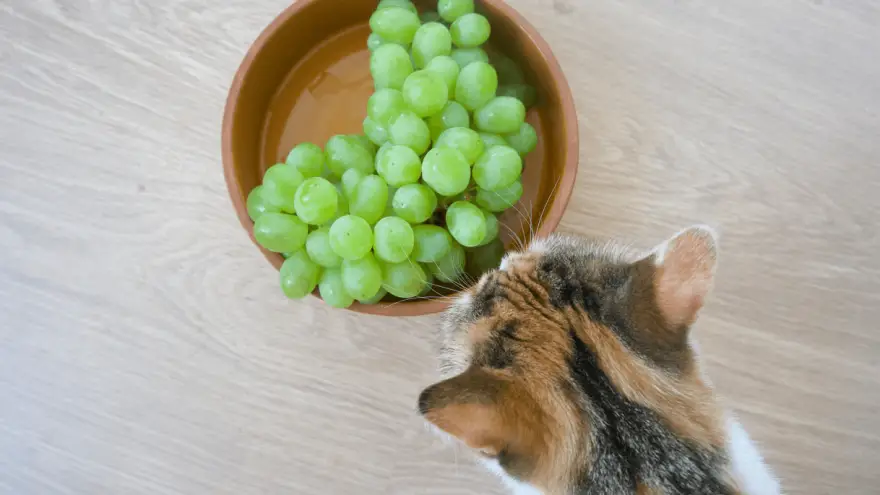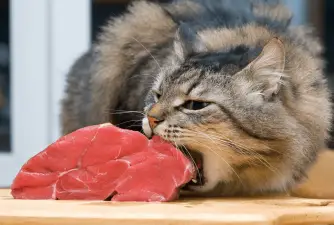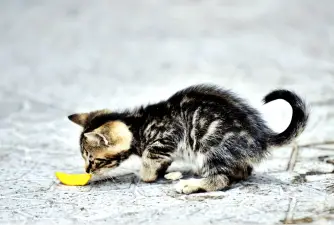Why Is Not Smart To Share Grapes With Your Cat?
13.03.2022.
You've probably heard that grapes aren't the best snack for dogs, but can cats eat grapes? The answer is somewhat complicated. One or two grapes are unlikely to cause harm, but a large amount can be toxic to felines, posing a serious risk. Grapes are high on the dangerous food list for pets and can cause food poisoning in cats that’s worse than chocolate! Here’s what you should know about cats and grapes.
Can Cats Safely Eat Grapes?
We don't recommend it, but technically, cats can eat grapes in tiny amounts. Most cats dislike fruits, including grapes, but some may enjoy the texture and have a couple of grapes as a healthy snack from time to time.
RELATED: Can Cats Eat Bananas? What Would Your Vet Say?
However, cats do not require grapes in their diet, so why risk feeding them? As obligate carnivores, felines' dietary needs are met solely by animal meat. To accommodate the now-domesticated house cats who once roamed the wild, commercial cat food companies pack all those proteins and minerals into bite-sized kibble. There is no need to supplement their diet, but if you do, choose foods that are known to be safe for cats and avoid grapes.
Why are Grapes Harmful to Cats?
To begin, there are a few reasons why feeding our feline friends sweet fruit, in general, is not a good idea. Cats are obligatory carnivores, which means that the majority of their diet should consist of meat protein. Cats also lack sweet taste receptors, so they won't appreciate sweet fruits as much as we do! That means grapes would be an unusual addition to a cat's diet – as well as an unnecessary risk, given how dangerous this bite-sized fruit is for dogs.

Grapes may also be toxic to cats, according to some evidence. After consuming this sweet fruit, some cats experienced gastrointestinal upset. More severe problems such as kidney failure have also been reported. Grapes are dangerous to dogs because they can cause kidney failure, which can be fatal. This is why you mustn't feed grapes to your pet.
Another reason to keep grapes away from curious cats is that the fruit can be a choking hazard, especially if it contains seeds.
How Many Grapes Will Make a Cat Sick?
Unfortunately, we do not know how many grapes would be required to poison a cat. Some cats who consume grapes may never show any issues, but the risks are simply too great. Because the precise amount of grapes required to make cats sick is unknown, the safest approach is to avoid giving your cat any grapes.
RELATED: Can Cats Eat Blueberries? Are They Safe?
What Kinds of Grapes Should Cats Stay Away From?
According to our expert vet team, all grapes and raisins (seeded/seedless, organic/conventionally grown, purple/green, etc.) can cause toxicosis in pets. Grape and raisin products, such as grape juice, raisin bread, cookies and protein bars containing raisin paste, and bread made with raisin juice should also be avoided.

What Symptoms of Grape Toxicity do Cats Show?
We already mentioned it is entirely possible your cat will eat some grapes and show no signs of toxicities or other problems. However, you can never be sure. That’s why cat owners who love grapes should know how to spot signs of grape toxicity. The following symptoms may indicate that your cat is suffering from grape toxicity:
- Vomiting
- Pain in the abdomen
- Lethargy
- Loss of appetite
- Diarrhea
- Extreme thirst
If you notice any of these symptoms, contact your veterinarian right away. It is critical to act quickly because these symptoms may indicate kidney failure. Because this is a severe condition, it is essential to seek professional assistance as soon as the first signs of toxicity appear.
RELATED: Can Cats Eat Strawberries? Will They Benefit From Them?
How to Treat Food Poisoning in Cats
To remove the toxin from the cat's body, a veterinarian will induce vomiting. They may then administer activated charcoal to attract any remaining toxic particles, transport them through the GI tract, and eliminate them from the body.
Some cats may require hospitalization in order to receive IV fluids to increase urine production and protect the kidneys. A veterinarian team will perform blood tests and monitor the kidneys for up to 72 hours after ingestion. Most cats recover completely if there are no signs of kidney damage after two or three days.

What Can I Do If My Cat Consumes Grapes?
Contact your veterinarian immediately if you know or suspect that your cat has eaten grapes. You can also contact the Pet Poison Helpline (855-764-7661). You don't have to wait until you notice clinical symptoms to seek help. Grape toxicosis is a disease that worsens over time, so the sooner you treat it, the better.
RELATED: Can Cats Eat Watermelon?
Tips for Preventing Cats From Eating Grapes
Even though most experts agree that grapes are toxic to cats, this does not mean you should stop eating the fruit. Here are some tips to keep cats away from grapes:
- If you have a curious cat, it's best not to leave grapes on the kitchen table or counter. Instead, keep them in the fridge or a cat-proofed cupboard where your cat won't be able to open them.
- After a shopping trip, make sure you don't leave your shopping bags unattended, as a curious kitten could easily sneak in.
- Feeding your cat table scraps is not a good idea, especially during the holidays when many foods may contain raisins (dried grapes).
World Cat Finder Team







Share